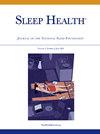白天摄入较多的水果和蔬菜预示着年轻人夜间睡眠受到的干扰较少。
IF 3.4
2区 医学
Q2 CLINICAL NEUROLOGY
引用次数: 0
摘要
背景:观察性研究表明,高质量的饮食与更好的睡眠质量有关。然而,考虑到饮食调整可能是一种实现更好睡眠的新颖而自然的方法,我们需要更好地了解这种联系。目的:在自由生活条件下,通过多天的自我报告饮食监测和客观睡眠测量,研究白天饮食摄入如何影响第二天晚上的睡眠质量。方法:参与者是年轻的美国成年人,平均每晚习惯性睡眠时间在7到9小时之间。使用自动自我管理的24小时饮食评估工具对饮食进行评估。睡眠用手腕活动记录仪测量。采用睡眠碎片化指数客观评价睡眠质量。结果:34名参与者(年龄:28.3±6.6岁,BMI: 24.1±3.9 kg/m2,男性82.3%,少数民族50.0%)提供201组配对饮食-睡眠数据。白天摄入更多的水果和蔬菜(β-系数(SE)=-0.60 (0.29), P= 0.038)和碳水化合物(-0.02 (0.007),P= 0.022),但不摄入添加糖(P= 0.54),与较低的睡眠碎片指数相关。研究发现,摄入更多的红肉和加工肉(P= 0.10)与更严重的睡眠中断有关,摄入更多的纤维(P= 0.08)和镁(P= 0.09)与较少的睡眠中断有关。结论:白天摄入更多的水果、蔬菜和碳水化合物,与健康的饮食相一致,与夜间睡眠较少受到干扰有关。按照饮食建议,每天多摄入5杯水果和蔬菜(从不摄入开始),睡眠质量就会提高16%。这些发现表明,富含复合碳水化合物、水果和蔬菜的饮食可以促进更好的睡眠健康。临床试验注册:NCT03663530和NCT03257137。本文章由计算机程序翻译,如有差异,请以英文原文为准。
Higher daytime intake of fruits and vegetables predicts less disrupted nighttime sleep in younger adults
Background
Higher-quality diets are associated with better sleep quality in observational studies. However, a better understanding of this association is needed given that dietary modifications could represent a novel and natural approach to achieve better sleep.
Objective
To examine how daytime dietary intakes influence sleep quality on the following night using multiple days of self-reported diet monitoring and objective sleep measured under free-living conditions.
Methods
Participants were younger US adults with average habitual sleep duration between 7 and 9 hours per night. Diet was assessed using the Automated Self-Administered 24-Hour Dietary Assessment Tool. Sleep was measured using wrist actigraphy. Sleep fragmentation index was used for objective assessment of sleep quality.
Results
Thirty-four participants (age: 28.3 ± 6.6 years, BMI: 24.1 ± 3.9 kg/m2, 82.3% males, 50.0% racial/ethnic minority) provided 201 paired diet-sleep data. Greater daytime intakes of fruits and vegetables (β-coefficient (SE) = −0.60 (0.29), P = .038) and carbohydrates (−0.02 (0.007), P = .022), but not added sugar (P = .54), were associated with lower sleep fragmentation index. Trends toward associations of higher intakes of red and processed meat (P = .10) with more disrupted sleep, as well as higher fiber (P = .08) and magnesium (P = .09) intakes with less disrupted sleep, were observed.
Conclusions
Higher daytime intakes of fruits and vegetables and carbohydrates that align with a healthy diet were associated with less disrupted nighttime sleep. A 5-cup increase (from no intake) in fruits and vegetables, meeting dietary recommendations, was associated with 16% better sleep quality. These findings suggest that diets rich in complex carbohydrates, fruits, and vegetables may promote better sleep health.
Clinical trial registry
NCT03663530 and NCT03257137
求助全文
通过发布文献求助,成功后即可免费获取论文全文。
去求助
来源期刊

Sleep Health
CLINICAL NEUROLOGY-
CiteScore
6.30
自引率
9.80%
发文量
114
审稿时长
54 days
期刊介绍:
Sleep Health Journal of the National Sleep Foundation is a multidisciplinary journal that explores sleep''s role in population health and elucidates the social science perspective on sleep and health. Aligned with the National Sleep Foundation''s global authoritative, evidence-based voice for sleep health, the journal serves as the foremost publication for manuscripts that advance the sleep health of all members of society.The scope of the journal extends across diverse sleep-related fields, including anthropology, education, health services research, human development, international health, law, mental health, nursing, nutrition, psychology, public health, public policy, fatigue management, transportation, social work, and sociology. The journal welcomes original research articles, review articles, brief reports, special articles, letters to the editor, editorials, and commentaries.
 求助内容:
求助内容: 应助结果提醒方式:
应助结果提醒方式:


